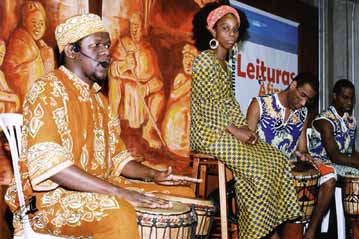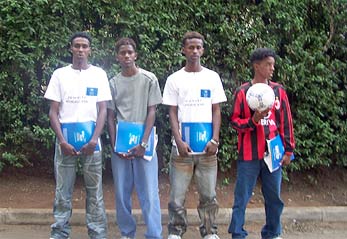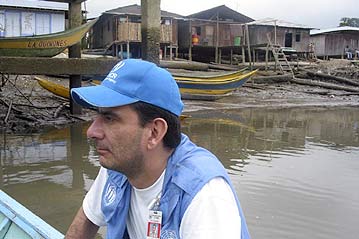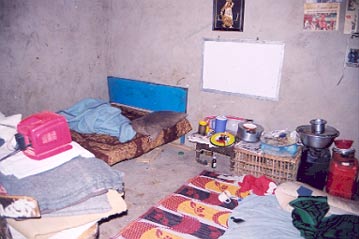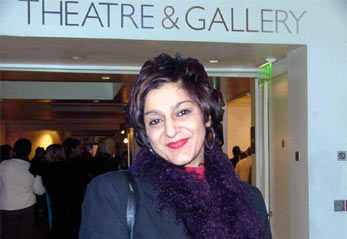Recovering Hope: Micro-credits for refugees in Argentina
Recovering Hope: Micro-credits for refugees in Argentina

BUENOS AIRES, Argentina (UNHCR) - Towards the end of a bleak winter plagued by economic recession and a difficult political environment, nine refugees in Argentina were given the chance for a new beginning. On August 28, four women and five men received the first small loans made available to refugees in this South American country, thanks to support from civil society and the UN refugee agency.
At the award ceremony, UNHCR Programme Officer Agni Castro expressed what many in the audience felt: "The micro-credits represent a recovery of hope and dignity." The refugees, who hail from Liberia, Mali, Nigeria, Pakistan and Peru, will be developing new projects in sewing, food delivery, handicrafts, welding and retail, or strengthening small businesses they have already set up in these areas.
The project started four months ago in an attempt by the government and non-governmental refugee support network to help refugees make a living in the prevailing context. "The Argentine market was so difficult and the situation so overwhelming that we all had to come up with a new way to help refugees," said UNHCR Regional Representative Anton Verwey.
Micro-credit specialists were called in to provide training and advice to the UN refugee agency and its partners. This resulted in CREER (Credits for Refugee Enterprises, or "BELIEVE" in Spanish), a credit programme for refugees who present convincing business proposals and demonstrate their capacity to manage small enterprises. The programme is run by the Argentine Catholic Commission (FCCAM), UNHCR's non-governmental partner in Argentina.
In designing the programme, FCCAM introduced it to 27 refugees selected based on their previous work experiences, and incorporated their suggestions. Once this consulting process was completed, the programme was re-submitted to the refugees for final approval.
To qualify for the loans, applicants must go through training courses on small businesses, and submit credible feasibility plans. The courses enable refugees to set their business goals, design a business plan, and carry out costing exercises. Thanks to agreements between FCCAM and a number of different public and private institutions, once the refugees receive the loans, they are also eligible for free courses on their particular business sector.
Two Pakistani beneficiaries learnt a vital lesson for the success of their business. Though very good at retail, their previous reliance on verbal agreements with their customers had undermined their profits. Through the general micro-credit courses provided by CREER, they realised they have to make sure all business transactions are recorded in writing, and are now better equipped to manage their business.
With his loan, Javeh will expand his food business by including deliveries for the employees of a nearby bank, while Mehmood will bring in new stock for his clothes retail business in the beach resort of Mar del Plata. Javeh, Mehmood and other loan recipients will be invited to share their experiences with new candidates in courses offered later on.
"I hope you buy the clothes I design. I'm wearing what I've made," said Ametha, a proud 32-year-old Liberian woman who just received a loan with which she will be buying her first sewing machine. She arrived in Buenos Aires 10 years ago and now lives alone with her five-year-old daughter. Ametha studied clothing design after arriving in Argentina and will now be taking advertising courses while she sets up her business. She seems happy and optimistic.
William, a Peruvian who works in clothes retail, and who has already demonstrated a sharp business sense, also qualified for micro-credit. "I am very grateful. I want to thank all of you for your effort and for giving us this opportunity," he said.
All those involved in the programme now face the challenge of ensuring its success and the availability of loans for other refugees. Recipients must begin to repay a part of the loan after two months. If they live up to their obligations, they also become eligible for further loans.
Addressing the refugees and their families at the ceremony, UNHCR's Verwey said, "Micro-credits are a good resource but the results depend on you. If you reimburse the amount you've received, new projects for other refugees will be possible. This kind of initiative is based on your goodwill, effort and honesty and I'm sure you will be able to build your future with your own hands."
It is hoped that in this difficult job market, the loans will also help nationals and other refugees who, though not receiving the loans themselves, may find job opportunities in the new or expanded businesses.
Micro-credit programmes have helped many refugees in Central America and Mexico. CREER is the first of its kind in Southern Latin America. Other similar programmes will be started first in Uruguay and Chile, and later in other countries of the region. They are expected to provide many other refugees with the opportunity to be responsible for their destiny, and to feel useful and valuable to the societies they are now part of.
By Maria Julia Contardi and Nazli Zaki
UNHCR Argentina

